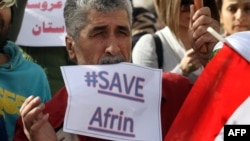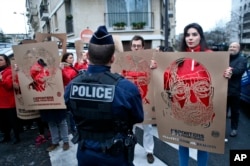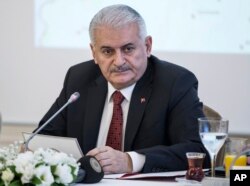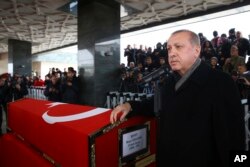A crackdown on dissent over Turkey’s military operation against a Kurdish militia in the Syrian Afrin enclave is increasingly targeting journalists. Police detained four journalists in dawn raids Monday and Tuesday, over postings on social media in relation to the Afrin operation. Human rights groups say the arrests are part of a wider crackdown on social media use.
Hayri Demir and Sibel Hurtas were detained late Monday night and in the early hours of Tuesday. Both journalists work for the Germany-based online news outlet Arti Gercek agency. Halkın Nabzı, editor in chief of the Ishak Karakas newspaper, and Nurcan Baysal, writer for the T24 news web page, were taken from their homes during the early hours of Monday. All four journalists were held under Turkey’s terror laws.
Rights groups claim the detentions could be more about silencing critical reporting.
“Sibel Hurtas, she was interviewing HDP representatives, getting their view on Afrin. She is now in custody, just because she was carrying out her job,” said Erol Onderoglu, Turkey’s representative at the Paris-based media rights group Reporters Without Borders. The pro-Kurdish HDP is a the country’s second-largest opposition party.
Hurtas’ only tweets since the start of the Afrin operation were postings of her reports and TV interviews.
According to press freedom groups, more than 100 journalists are already in jail under an ongoing state of emergency, introduced after a failed coup in 2016. This month, Turkey was downgraded to “not free” from “partly free” in the annual world report by Freedom House, a Washington-based monitoring group.
On Sunday, Prime Minister Binali Yildirim met with senior representatives of Turkey’s mainstream media to explain the ongoing military operation. The meeting drew criticism because Yildirim issued “suggestions” on how to report the conflict.
“The government has just installed a total censorship regarding Afrin; only good new cheerful news is allowed,” said political scientist Cengiz Aktar. “The media was gathered (by the prime minister) in Istanbul Sunday; (where) they have been given a 15-point memorandum about how and what to report …”
“The government is briefing mainstream media and teaching patriotic journalism on the one hand, and on the other hand is launching a crackdown on critical voices in the media,” said Onderoglu. “In a process of conflict, war or deep political crisis, is when you need more discussion, a more value approach to evaluate problems.”
Many of those detained were in Turkey’s predominantly Kurdish southeast, but there also have been arrests in western cites. In Istanbul, prosecutors have launched 57 investigations over accusations of spreading terrorist propaganda against the operation on social media.
Arrest warrants have been issued for 30 people in Istanbul and Ankara. The crimes they are accused of include “insulting public officials,” “inciting hatred and enmity among people,” “insulting the president,” “humiliating the Turkish people, government and the military organization overtly,” and “propagating terrorist organization” for their posts on Twitter. Some of those detained have been subsequently released.
“There is a big crackdown under way against people who are tweeting,” warned Emma Sinclair-Webb, chief researcher for U.S.-based Human Rights Watch. “These are tweets by members of the public, by journalists and also by opposition party officials, as well. We are also hearing of lots of detentions by HDP officials in different towns, people being detained late at night and raiding HDP offices in certain towns.”
Analysts point out the crackdown is likely to be fueled by government fears of social unrest by Turkey’s large Kurdish minority.
In 2014, the siege of the Syrian Kurdish city of Kobani by the Islamic State group saw unprecedented numbers of Kurds protesting in Turkey against the government, accusing it of complicity with the jihadists.
The protests were not confined to Turkey's predominately Kurdish southeast; protests took place in many western cities where large numbers of Kurds live. Analysts say the magnitude of the unrest, which claimed more than 50 lives, shook President Recep Tayyip Erdogan.
The government blamed social media for exacerbating the unrest. In a series of televised speeches and public rallies across the country, Erdogan made clear he will not tolerate any dissent this time over the ongoing military operation in Afrin.
“Do not go out to the squares. Those who come out of the square will pay a heavy price,” warned Erdogan at a rally Sunday.
“The government here, it's afraid of street protests and it's very clear it's going to ban street protests,” said Sinclair-Webb. “We've seen this in Istanbul where people have not been able to assemble and protest. To protest is a right in the Turkish law. Even if the government has concerns about these protests potentially spiraling into violence, you cannot ban the right to assembly and that is what they seem to be trying to do.”







